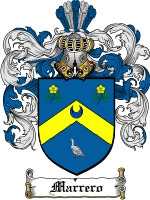
Welcome To Our Family Web Site

Surname / Apellido: Marrero
The Spanish surname of MARRERO was originally derived from the Old French word 'maistre', a superior, a teacher. In the 8th century, Spain fell under the control of the Moors, and this influence, which lasted into the 12th century, has also left its mark on Hispanic surnames. A few names are based directly on Arabic personal names. The majority of Spanish occupational and nickname surnames, however, are based on ordinary Spanish derivatives. The name was originally rendered in the Latin form MAGISTER. In early instances this name was often borne by people who were franklins or other substantial freeholders, presumably because they had labourers under them to work their lands, and unlike smaller free tenants did not just till their property themselves. In Spain identifying patronymics are to be found as early as the mid-9th century, but these changed with each generation, and hereditary surnames seem to have come in slightly later in Spain than in England and France. As well as the name of the traditional major saints of the Christian Church, many of the most common Spanish surnames are derived from personal name of Germanic origin. For the most part these names are characteristically Hispanic. They derive from the language of the Visigoths, who controlled Spain between the mid-5th and early 8th centuries. The origin of badges and emblems, are traced to the earliest times, although, Heraldry, in fact, cannot be traced later than the 12th century, or at furthest the 11th century. At first armorial bearings were probably like surnames and assumed by each warrior at his free will and pleasure, his object being to distinguish himself from others. It has long been a matter of doubt when bearing Coats of Arms first became hereditary. It is known that in the reign of Henry V (1413-1422), a proclamation was issued, prohibiting the use of heraldic ensigns to all who could not show an original and valid right, except those 'who had borne arms at Agincourt'. The College of Arms (founded in 1483) is the Royal corporation of heralds who record proved pedigrees and grant armorial bearings. The bulk of European surnames in countries such as England and France were formed in the 13th and 14th centuries. The process started earlier and continued in some places into the 19th century, but the norm is that in the 11th century people did not have surnames, whereas by the 15th century they did.